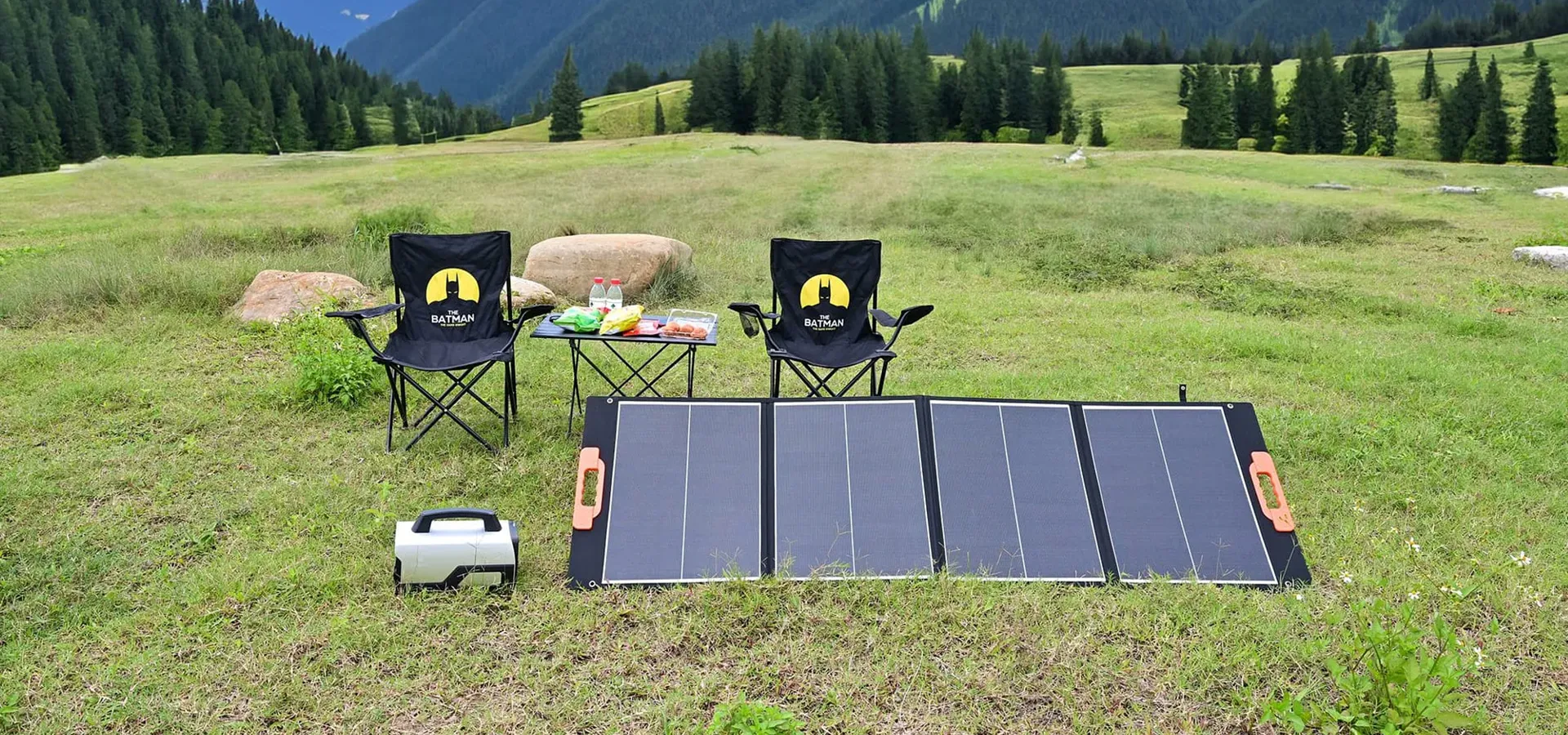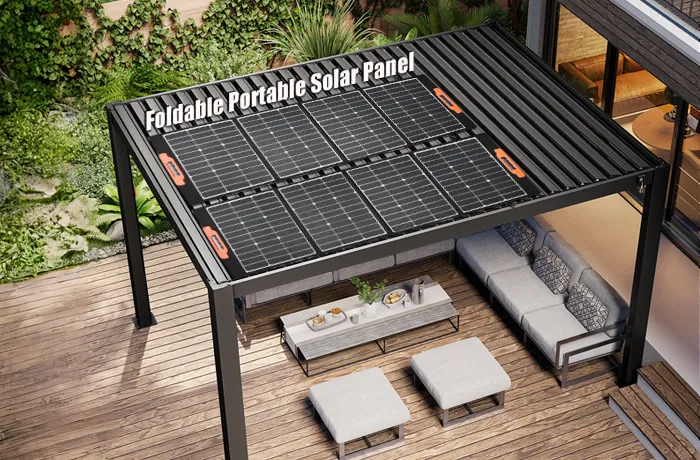Today, solar panels are no longer just found on rooftops and solar power plants. There are now many portable solar charger for camping, RVing, and emergency kits. Additionally, you can purchase portable solar panels for home use. It is very convenient to have one at home. In this blog, we’ll explore how do portable solar panels work , their various forms, and their pros/cons so you can decide if you need portable solar panels for your home.

Pros and Cons of Having Portable Solar Panels
Now that we know the different types of solar panels, let’s look at the pros and cons of solar panels.
What’s the best thing about portable solar panels?
Portable solar panels are versatile. You can use them at home or while traveling. Here are some of the main advantages of using portable solar panels:
Versatility
Portable solar panels can be adapted to different functions or activities. For example, solar panels can be used in both fixed locations and mobile uses.
Stationary use mainly involves portable solar panels on the roofs of homes and buildings, as well as on top of vehicles. Using solar panels for these purposes often involves combining them with batteries and other components to form a full-fledged portable power system.
Most portable solar panels are not suitable for stationary use. They are designed for people who use it on the go. Mobile use of portable solar panels can be used to power/charge small electronic devices such as smartphones and lights.
portable solar panels for rv ,camping, hiking, fishing, and more. Typically, these portable solar panels work in conjunction with a portable solar generator. They are used to charge solar generators as backup power.
Weatherproof
Most small and foldable portable solar panels are waterproof, using IP67 waterproof technology. Most waterproof solar panels can be installed on your home, cabin or vehicle.Additionally, waterproofing is also available for the charge controller. This feature contributes to its versatility. By investing in flashings and accessories, you can ensure they’ll be successful in heavy rain.

High quality solar cells
In most cases, portable solar panels are usually monocrystalline silicon. As a result, efficiency levels are significantly improved.
During the manufacturing process, silicon is formed into rods and then cut into wafers for single-crystal cells. Interestingly, the term “monocrystalline” implies the use of a single crystal of silicon. Thanks to the use of monocrystalline silicon, electrons can move more freely, delivering more power from the panel to charging devices.
Overcharge protection
Some portable solar panels come with solar charge controller. Therefore, these charge controllers provide overcharge protection.
Additionally, some of these charge controllers support fast charging and other compelling features. Essentially, they limit the rate at which current flows through the battery. Without a charge controller, the device may be damaged.
In addition to overcharge protection, the solar charge controller also protects against overvoltage. When an overvoltage condition occurs, battery performance can drop dramatically. Please note that overcurrent and overvoltage may pose safety risks.
Therefore, it is best to find a solar panel with a charge controller to prevent these situations from happening.
Providing renewable energy
As you know, the sun releases renewable energy in the form of solar energy.
This energy, in turn, is harnessed by solar panels. Surprisingly, renewable solar energy is not limited to any specific location. The beauty of solar energy is that it is available all over the world.
Lower utility bills (home use)
Paying energy bills can be overwhelming for many people. Luckily, solar panels can help solve this problem, too. By installing a solar panel system on your home, you can significantly lower your utility bills.
The use of solar panels significantly reduces commercial electricity usage. For example, you can use power-hungry appliances like microwaves with solar power.
However, solar panel size still plays an important role. The larger the panel, the more efficiently it captures solar energy. Ultimately, using solar energy to save money on utility bills is a great way to help you and your family reduce expenses.
What are the main Cons of portable solar panels?
With every product, there are usually one or more disadvantages. Often, this is due to personal taste, product construction, or other reasons. For these reasons, I decided to show you some of the disadvantages of portable solar panels.
reliability
Portable solar panels are unreliable and cannot meet standard power needs. Mainly because they depend on a lot of driving factors. For example, their reliability decreases when weather conditions are severe. They won’t perform at their best during stormy, cloudy or rainy days. The actual output energy is much lower than the potential output energy.
pollute
Solar energy is a very clean energy source. In other words, it doesn’t particularly affect our immediate environment. The problem lies in the manufacturing process. When solar panel manufacturers, large amounts of toxic waste are often generated. Unfortunately, these toxic wastes are very harmful to the environment. So far, significant amounts of cadmium and lead have been diffused. Additionally, wastes such as silicon tetrachloride are not properly managed during the production process. Silicon tetrachloride in the environment can gradually cause irritation to the eyes and upper respiratory tract. Unfortunately, cadmium in the environment can also affect the kidneys, bones, or liver in humans. Cadmium is a very harmful substance in plants.
Need space
While this factor does not apply to most portable solar panels, it does apply to most suitcase solar panels as they are bulky even when folded.
No matter where you want to install your solar panels, space is of the essence. If there’s no place to install solar panels, they won’t work.
If you live in an urban environment with little sunlight available to place solar panels, space will be an issue with a suitcase solar panel. This also applies if you plan to use a suitcase solar panel on top of your car while traveling. Make sure the size of the solar panels is small enough to fit within the parameters of the roof.
Generally speaking, most portable solar panels can be used in almost any situation as long as they are easy to fold and small in size.
Durability
Rooftop solar panels have a lifespan of at least 25 years and often come with a long warranty. Rooftop solar panels typically have a frame and a mounting system to secure them to the roof. On the other hand, while portable solar panels are usually supported by stands and are usually waterproof, they can cause problems in heavy rain. Since they are not connected, solar panels can be damaged by strong winds.
May not qualify for solar panel tax credit
If you’re looking to maximize your solar panel tax credit, owning an RV and purchasing a portable solar system is a great option. Residential and commercial systems qualify for federal solar tax credits, but portable systems only occasionally qualify.
Slow Charging
Solar charging can be slow compared to other charging methods.

Frequently asked questions about solar panels
What kind of power can portable solar panels provide?
It’s obvious that portable solar panels can’t power every device. However, when purchasing solar panels, wattage (W) is a measure of power. This means that the greater the wattage of a solar panel, the more electricity it produces.For example, you might see solar panels rated at 100-200W. 100W solar panels are one of the most common solar panel sizes.A panel of this size can provide enough power to run a large fan continuously in full sunlight. However, it is not recommended to run any appliance or device directly from solar panels unless there is a solar charge controller or management system that can adjust the current to properly power your devices.Using solar panels to charge batteries is often ideal. Then, as the battery stores energy, it can provide smooth, stable power to electronic devices.
On the other hand, there are some portable solar panels that have USB attachments on the back that make it easy to charge your devices. Many portable solar panels are 100W or less. The average power of portable solar panels is around 20-30W. These panels almost always come with a USB connection to charge small devices directly from the panel.
Can solar panels be folded?
Portable solar panels are great for people camping, hiking, fishing, and even hunting. Folding solar panels are ideal for storage on these adventures, and most portable solar panels are foldable.
Can I use portable solar panels at home?
Yes, they can be used to power appliances and electronics in your home. However, portable solar panels cannot provide enough energy to power the average home, which consumes an average of 30 kilowatt hours (or 30,000 watt hours) of electricity per day. So if you want to use them to power your entire home, they may need to be paired with other power stations or portable solar generators.
What can you run on a portable solar panel?
This depends on the power provided by the portable solar panels. You can use the 50 watt portable solar panel to charge cell phones, power banks, camping showers, 12-volt batteries, and other low-voltage gadgets. The 100 watt portable solar panel can charge medium-voltage devices such as laptops and cooling fans, while the 200-watt portable solar panel can charge high-voltage devices such as small refrigerators.
Do portable solar panels require direct sunlight?
Solar panels are most effective when exposed to direct sunlight, but they don’t exactly need it to operate. That’s because of photons: particles that absorb light and convert it into electricity in photovoltaic (PV) panels.
Although direct sunlight produces more photons than indirect or partial shade, solar energy can still be generated from either light source. This means that without a sustainable power supply, even cloudy skies won’t leave your home!
are portable solar panels worth it?
Yes, they are. The same technology that allows homes to run on 100% solar energy is used, albeit in a much more compact design. Because of this, they can’t provide as much energy as full-size solar panels, but they are effective.
In Conclusion
Portable solar panels are beneficial for hiking, camping, and all other related activities. Additionally, most panels are versatile, waterproof, and low maintenance.











